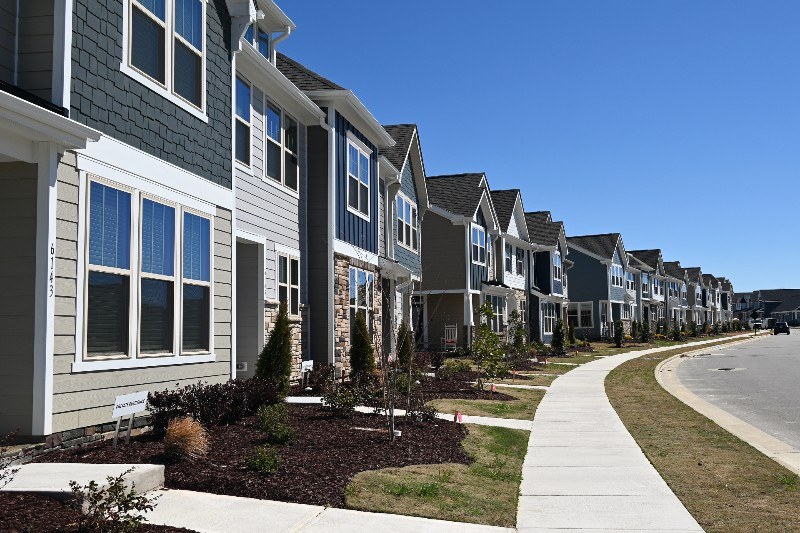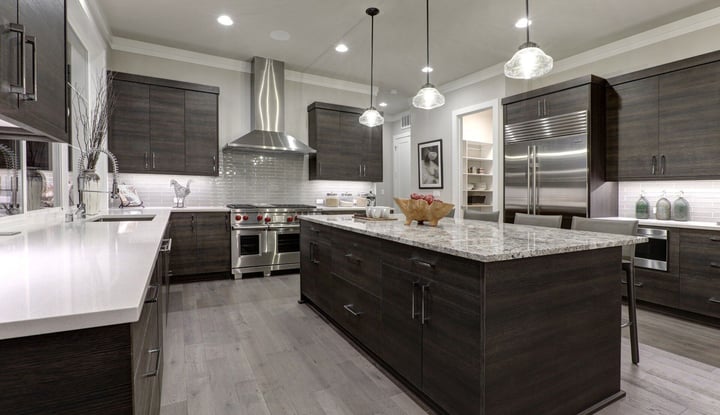
The 5 Best San Diego Suburbs for Affordability and Commuting
Posted on Apr 26, 2023
San Diego is renowned for its balmy weather, beautiful beaches, and ample career opportunities. The...

Posted on Apr 26, 2023
For buyers who may have wanted a single family home but found themselves priced out in recent years, a townhome can be a more affordable alternative that still offers many of the benefits they’re looking for.
One question many investment-savvy buyers ask themselves is: are townhomes hard to sell?
Due to their layout and size, townhomes often represent a starter home - in other words, because buyers predict that they may end up selling it and upgrading within the next few years, it's important that they can sell it without a hitch.
Although some people believe that townhomes are bad investments, similar to the 20% down adage, it doesn't usually hold true for the modern buyers.
There are advantages and disadvantages to townhomes, so it’s incorrect that townhomes are hard to sell! Here’s why.
One of the main benefits of townhomes is that they require less maintenance than a single-family home. There’s no huge lawn to take care of, and townhomes are often smaller in general - meaning less space to clean.
There is usually an HOA associated with a townhome. Of course, plenty of people would prefer not to have an HOA because of the cost and because of the control HOAs exert. If you want to have a pink flamingo statue on your lawn, for example, HOAs are probably not the right choice for you.
Many people do like HOAs, however, because HOAs lower the cost of maintenance, cut down on the time homeowners have to be involved with maintenance, and can lower the cost of homeowner’s insurance as well. An HOA might cover small maintenance costs like snow plowing, or even large maintenance costs like roof repairs (depending on the HOA).
This can be extra appealing to buyers like baby boomers who are downsizing and don't want to take care of things like landscaping.
HOAs often cover additional amenities that make them attractive. A pool can be expensive and difficult for an individual owner to maintain - especially if it’s something they occasionally, but not frequently, want to use. An HOA can cover the cost and maintenance of a community pool.
HOAs - and therefore townhomes - are appealing to people who want to build equity and have control over their living situation through home ownership, but who don’t necessarily want to be burdened with a ton of maintenance issues.
Something worth noting: in 2022, Redfin reported that 3% more of its customers’ offers face bidding wars on townhouse purchases compared to offers on single-family homes. As interest rates and home prices rose, many buyers found themselves priced out of single-family homes - making townhomes an easier step into becoming a first-time homebuyer.
In fact, homebuilders have not been building enough starter homes over the last decade. The cost of construction and zoning difficulties mean that it’s often more profitable for builders to create luxury homes. For this reason, townhomes may see renewed interest in the coming years from both baby boomers looking to downsize and millennials looking to land their first home. Townhomes offer a more attainable start for those starting out, and lower maintenance for those reaching retirement age.
In other words, townhomes likely have a rosy future until homebuilders start cranking out more starter homes.
If you're looking for exact numbers on how long it takes the average townhome to sell in the area you're interested in - and how much they've appreciated since they were last sold - a Realtor can answer these questions. Our team can help you out. As salaried agents their goal isn't commission bonuses, it's client satisfaction.
Square footage is often a key consideration for homebuyers, especially post-COVID due to how many people are working from home (and need additional work space). Townhomes are often smaller and more expensive per square foot, which means they just won’t have the big-space allure of a single-family home.
Here are some of the top factors that can make townhomes harder to sell:
If HOA fees are too high, potential homebuyers can balk - and that's something that can change after you move in. It's always a good idea to research the HOA of the location you'll live in. Ask neighbors whether fee increases over the past several years have been reasonable.
Virginia-based Houwzer Realtor Muoki Musau explains that, in his experience, townhomes have no problem selling - but some units are more valuable than others.
"Townhomes are not hard to sell, because they are often the first home people purchase. Often, though, an end-row townhouse has a higher potential to sell compared to an interior unit, because of the size, its extra lot space, and only abutting to one unit instead of sandwiched between two units," explains Musau. "In communities where parking is tedious, though, garage townhomes sell better because they solve an important problem. But a well-priced, well-maintained home - especially in a desirable area - will sell properly."
Location is a factor when it comes to how easy it is to sell a townhome. In some cities, townhomes are so common that buyers aren’t really deterred from buying them (since few other options are available). In Philadelphia and Baltimore, for example, town homes make up a formidable percentage of city housing stock.
In other cities where land is not at a premium, townhomes might be less popular since they have limited outdoor space, less privacy, and often come with additional fees (like an HOA) compared to abundant single-family homes.

Townhomes appreciate at a similar rate to single-family homes.
If you take a look at the available properties in your area, townhomes are likely less expensive than single family homes, but if you follow their change in price over the last 20 years, they likely have a similar trajectory to single family homes.
If it were true that townhomes appreciate more slowly, then over the years the price per square foot would begin to lag far behind single-family homes - and you would see homebuyers getting exceptional deals. In reality, though, there are no $80,000 townhomes in areas with single-family homes averaging $300,000 - because appreciation is fairly level.
"One of the most crucial factors for appreciation is the location of the home. A townhome in a desirable location will appreciate at the rate of homes in that area," explains Musau. "For example, a townhome in Leesburg, VA, would enjoy the 7% appreciation and potentially sell quickly because the city has had consistently low inventory over the last 12 months."
It’s true that you might see less profit on your townhome, and that’s often due to the HOA dues. If a homebuyer has a monthly budget of $2,000 and they buy a single-family home, most of that $2,000 is going toward their mortgage. If someone is buying a townhouse with an HOA, however, only $1,500 might be going to the mortgage and home insurance, and $500 is going to the HOA. So in this situation they might be able to afford a $300,000 single family home, but a $250,000 townhome (because of the HOA).
While the HOA might provide important amenities, as a homebuyer, you only see price appreciation on the cost of the property - not the HOA. Historically homes appreciate about 4% each year. A $250,000 home, in 5 years, will be worth around $304,000. A $300,000 home will be worth $365,000.
In other words, you’ll profit $10,000 more in home appreciation when owning the single-family home after just five years of home ownership (test these numbers yourself using GoAmplify’s home appreciation calculator) - not due to slower appreciation, but due to where your monthly fees are going.
A home is almost always a good investment if you're financially secure enough to buy one - even though there have been historical dips (like in 2007), historically home prices have always gone up.
"A townhome is a bad investment if it doesn't fit into the buyer's plans. If they can't afford it after buying it, it's a bad investment. If they're an investor and buy it to flip but they get their numbers wrong, it's a bad investment," notes Musau. "But in real estate, the longer you hold onto your property, the better chances the home will return a healthy investment. For example, my parents bought a townhouse in 2001 and even with the 2008 downturn, were able to sell it in 2016 for 140% of its 2001 value."
He points out that, rather than seeing "townhome vs. single-family home" as the deciding factor, buyers should instead take a close look at what's included with the home. He recommends taking these factors into account:
Plenty of people may say that you should never buy a townhouse, but the truth is that if you have to choose between renting and buying a townhouse, buying makes more sense. When you pay your rent, you're paying your landlord's mortgage - and you're never seeing that money again. When you pay your own mortgage, you're building equity, locking in a monthly price, and eventually seeing price appreciation.
Ready to get out of your own rental - or at least explore your local options?
Subscribe to our newsletter to get essential real estate insights.

Posted on Apr 26, 2023
San Diego is renowned for its balmy weather, beautiful beaches, and ample career opportunities. The...

Posted on Apr 26, 2023
The rise of “foodie” culture has led to America's cities offering more culinary options than ever...

Posted on Apr 26, 2023
Despite its proximity to the nation's capital, Arlington has a distinct identity and culture, with...